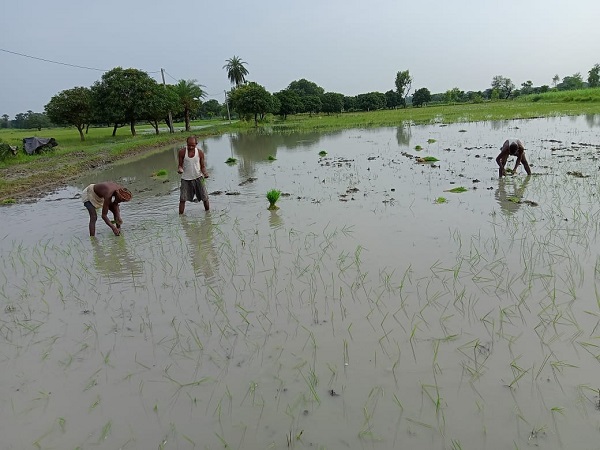Patna, (Asian independent) The concept of Bio-fortified rice farming is getting popular among farmers in Bihar these days as it is not just nutritious but also helps in increasing the farmers’ earning.
It is believed that bio-fortified rice has rich contents of nutrition including protein and zinc which is helpful to fight with malnutrition among children especially in a financially backward state like Bihar.
One such initiative was taken in Bihar’s Samastipur district where farmers started the cultivation of bio-fortified rice in Kalyanpur-Samartha village.
“We have started cultivation of bio-fortified rice in a 2.5 acre land in Kalyanpur- Samartha in Samastipur district as a pilot project and it has given good yield despite adverse situations. It is a new technique introduced in the farming sector not only to enhance the nutrition of a product but also to increase the earning of farmers. We need support from the state government to provide seeds,” a local farmer said.
“Over the years, more than 20 districts of North Bihar have been affected by floods every year. Last year, flood water entered into districts like Samastipur, Muzaffarpur and Vaishali. Interestingly, our crops sustained in adverse climatic situations and yielded a good amount of agricultural produce,” he said, while pointing out that the water logged in agricultural fields for extended periods due to choked drains connected with different rivers.
“I used one 2.5 acre land for farming and used 50 kg seeds of bio-fortified rice in Samastipur. Besides, the same cultivation is also done in Bela Bilaspur in West Champaran district,” he said.
The farmer was guided by some experts of India Council of Agricultural Research (ICAR) and Bihar origin NRIs related to an USA based forum called Global Indian Scientists and Technocrats (GIST).
Sharad Mohan, a Bihar origin NRI based in USA along with some other technocrats were working in the field of technologically upgrading Indian agriculture, had planned such an initiative last year.
“We took it as challenge to connect technology with farmers that would not only enhance their income but also help to fight micronutrient deficiency,” Mohan said.
The shift from normal farming of paddy to bio-fortified rice may prove to be a boon to the state like Bihar that ranks lowest with more than 48 per cent stunted children in the country.
“It could be a good initiative to introduce bio-fortified rice in the mid-day meal program of the state government in schools, Anganwadi centers and different food distribution programs to cater the needs of poor families having undernourished children. The bio-fortified rice has high protein content of 10.1 per cent and Zinc containing 20 ppm as per the claim of National Rice Research Institute Cuttack,” Mohan said.
“Bio-fortification could be a step for India’s transition from availability and access to nutrition security and eradicating hidden hunger. I firmly believe that Bihari Thali would soon transform into a Nutria-Thali after adoption followed by replication of the practice by the farmers in the state,” he said.
“Some of the senior officials Ashok K. Singh, DDG of ICAR has shown special interest in this initiative. He has provided expert views and support for the farming of bio-fortified rice,” Mohan added.
“The cultivation of rice would certainly fetch a premium price in the market. It required branding followed by awareness and advertisement at government level to promote this product. Qualitative analysis, especially nutrition aspects mentioned on the packets are key here to promote the product. At present, rice means carbohydrate which the people know. Once they know about the nutrition aspect like protein and zinc, people from across the country and world attract towards it,” said Aditya Satsangi, a USA based agriculture trader and owner of a farm named kisanpro.com.
“India is a big market for bio-fortified rice. Prime Minister Narendra Modi has also pointed out this in his Independence Day speech from Red Fort this year. Besides India, if we target African countries, it would give good export opportunities to generate foreign revenue for the domestic farmers as well,” Rachit Garg, a trader of HFN Mandi said.
“We are looking forward to buying bio-fortified rice from farmers of Bihar and selling it off in the countrywide market,” he says.
Bihar has good potential to produce bio-fortified rice especially in districts such as Rohtas, Kaimur, Bhojpur, Buxar which are known as “Dhan Ka Katora” of Bihar. Apart from these districts, the cultivation of rice is being done in all 38 districts as well.








